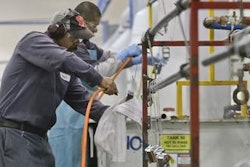This article originally appeared in the October print issue of IMPO Magazine. To view the digital version, click here.
As candidates from both sides of the aisle start to hit the lengthy Presidential campaign trail, U.S. manufacturing, as usual, becomes the focus of more than a few debate points on job development, the trade deficit, and ‘reshoring.’ Those of us who are at the ground level participate in this complex discussion day in and day out — and even though we’re all pro-U.S. manufacturing, we don’t always agree on the details of how to set about improving its prospects.
Case in point: Walmart has committed to increase its U.S. purchases by $50 billion annually by January of 2023. According to the mega retailer’s Jobs in U.S. Manufacturing Portal (JUMP), a website built to track the endeavor, Walmart is investing $250 billion in products that support American jobs over 10 years.
Despite this high profile promise, to some manufacturing stakeholders, Walmart is still the enemy. AAM’s Scott Paul has taken particular delight in unraveling some of Walmart’s claims regarding the made-in-the-USA status of their products. In several infographics, AAM suggests that 2/3 of Walmart’s supposedly American-made goods are actually grocery items — a far cry from the reshoring rhetoric that has accompanied the retailer’s promises since 2011. In fact, AAM claims that 2.7 million American jobs have been lost due to Walmart’s imports from China, estimating that Walmart has relationships with some 20,000 Chinese suppliers.
But despite the skepticism that has accompanied the pledge, others in the industry are getting on board – even getting in bed – with Walmart.
In late August, The Reshoring Initiative announced a program in partnership with Walmart, to help companies manufacture more consumer products in the United States. According to Harry Moser, founder and president of the Reshoring Initiative, “We were honored to be called on by Walmart to support its Made in the USA program. We estimate the company’s increased purchases will add 300,000 U.S. manufacturing jobs. Helping Walmart succeed fits our mission perfectly.”
And while Walmart was clearly in need of a high profile industry group to align with in an effort to validate the sincerity of their intentions, I do know that the Reshoring Initiative, and Moser himself, have a pretty sterling reputation. It appears the group is taking an opportunity to spur some momentum for Walmart and its suppliers, and has concluded that Walmart “is currently the largest force driving reshoring.”
In a guest blog for Supply Chain Management Review, Executive Director of the like-minded Reshoring Institute, Rosemary Coates, suggests that “because of Walmart’s size and influence, other retailers are likely to follow Walmart’s lead and establish initiatives of their own.”
So even if AAM sees Walmart’s claims as subject to interpretation, perhaps the claims themselves will be contagious enough to ignite a more significant push towards U.S.-made goods. Once precedence suggests major retailers value U.S.-made goods over more profitable foreign-made products, it may just change the rules of the game. Whether these claims are true or false — or somewhere in between — may not actually matter most.
So which side of the fence are you on? Like AAM, do you see Walmart’s claims as more pandering than progressive? Or do they deserve our support because of the related impacts? Email me at Anna. [email protected].























